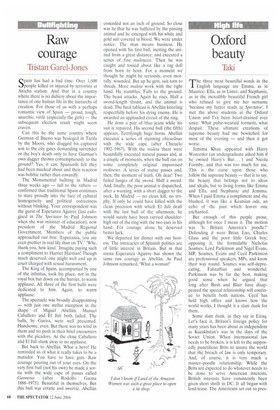Raw courage
Tristan Garel-Jones
Spain has had a bad time. Over 1,600 people killed or injured by terrorists at Atocha station. And that in a country where there is no dubiety about the importance of one human life in the hierarchy of creation. For those of us with a perhaps romantic view of Spain — proud, tough, anarchic, virile (especially the girls) — the subsequent election result might seem craven.
Can this be the same country where Guzman el Bueno was besieged in Tarifa by the Moors, who dragged his captured son to the city gates demanding surrender or the boy's death only to have Guzman's own dagger thrown contemptuously to the ground? Yes, it can. Spaniards felt they had been mucked about and their reaction was boishie rather than cowardly.
The Monumental bullring in Madrid three weeks ago — full to the rafters — confirmed that traditional Spain continues to stare proudly into the face of cultural homogeneity and political correctness without blinking. Your correspondent was the guest of Esperanza Aguirre (last eulogised in The Spectator by Paul Johnson when she was minister of education), now president of the Madrid Regional Government. Members of the public approached our box: 'Esperanza, you are even prettier in real life than on TV."Why, thank you, how kind.' Imagine paying such a compliment to Harriet Harman! Though much deserved, one might well end up in court charged with sexual harassment.
The King of Spain, accompanied by one of the infantas, took his place, not in the royal box but down on the barrier, to warm applause. All three of the first bulls were dedicated to him. Again, to warm applause.
The spectacle was broadly disappointing — with just one stellar exception in the shape of Miguel Abelian. Manuel Caballero and El Juli both failed. The bulls, by Gavira, were well presented. Handsome, even. But there was no wind in them and no push in their brief encounters with the picadors. At the close Caballero and El Juli slunk away to no applause.
But back to Abelian. What a hero! He reminded us of what it really takes to be a matador. You have to have guts. Raw courage pouring out of your ears. On the very first bull (not his own) he made a sortie with the wide cape of passes called Gaoneras (after Rodolfo Gaona 1888-1975). Beautiful in themselves. But this bull was erratic and swervie. Abelian conceded not an inch of ground. So close was he that he was buffeted by the passing animal and he emerged with his white and gold suit covered in blood. We were under notice. The man means business. He opened with his first bull, inciting the animal from a great distance, and executed a series of fine muletazos. Then he was caught and tossed about like a rag doll from horn to horn. For a moment we thought he might be seriously, even mortally. wounded. But up he gets, suit torn to shreds. More mu/eta work with the right hand. He stumbles. Falls to the ground. The beast attacks. Again he rises. Half a sword-length thrust, and the animal is dead. The final tableau is Abelian kneeling respectfully before his dying enemy. He is awarded an applauded circuit of the ring.
He dons a pair of blue jeans while his suit is repaired. His second bull (the fifth) appears. Terrifyingly huge horns. Abelian executes a series of stunning chicuelinas with the wide cape (after Chicuelo 1902-1967). With the muleta there were beautifully executed natural passes and, at a couple of moments, when the bull ran on some completely original improvised molinetes. A series of statue passes and, then, the moment of truth. Oh dear! Two failed lunges of the sword. Half a sword. And, finally, the poor animal is dispatched, after a warning, with a short dagger to the neck. In Madrid — no clean kill, no trophy. If only he could have killed with the clean precision with which El Juli dealt with the last bull of the afternoon, he would surely have been carried shoulderhigh out of the ring with the two ears in his hand. For courage alone he deserved better luck.
We departed for dinner with our hostess. The intricacies of Spanish politics are of little interest in Britain. But in that arena Esperanza Aguirre has shown the same raw courage as Abelian. As Paul Johnson remarked, 'What a woman!'


















































































 Previous page
Previous page